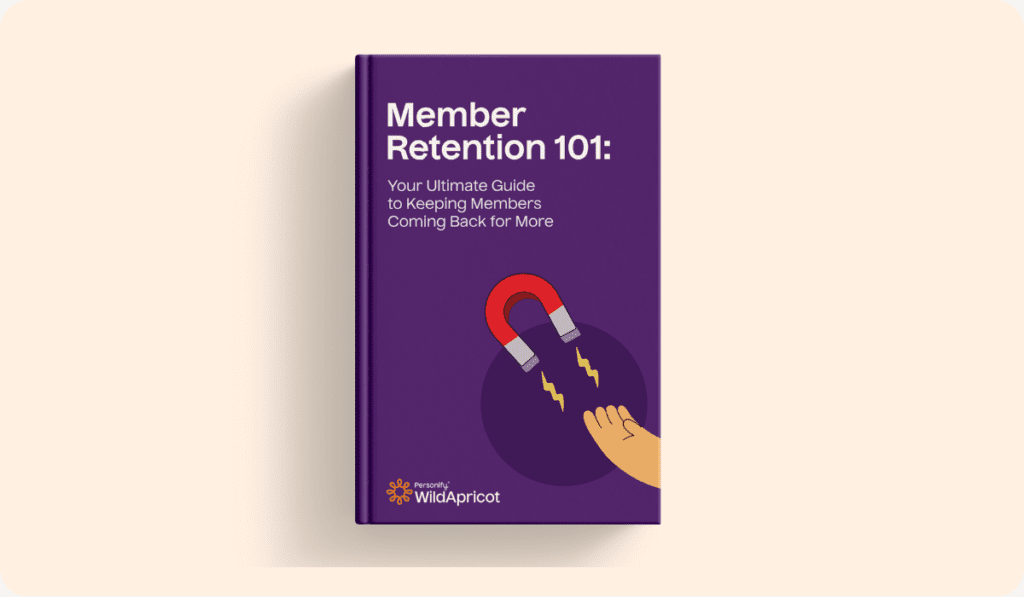You might be looking to enter the nonprofit world from one of many different starting points.
Maybe you’re fresh out of college and eager to change the world.
Maybe you’re mid-career and and hoping for a change.
Maybe you’re a parent looking for a workplace that offers a great work/life balance, or a near-retirees hoping to spend your last working years doing something meaningful.
Whatever your life path, you might have noticed there’s a lot of conflicting advice out there about working for a nonprofit or charity.
That’s what Michelle, a friend of mine from university, originally struggled with when she decided to enter the nonprofit world.
Although she had already volunteered at multiple nonprofits, she wasn’t sure which position would best suit her skills — or even whether her Master’s Degree was useful in the nonprofit world.
By helping her through her job hunt, and the nonprofit professionals I’ve connected with at through WildApricot, I’ve come to see that although working in the nonprofit realm seems simple on the surface, it’s anything but!
There are a lot of people out there like Michelle who want a career in nonprofit work — but thankfully, there are just as many nonprofits out there looking for strong candidates.
In this post, I’ll answer a few common questions about finding the perfect nonprofit job, including:
- Is nonprofit work right for you?
- What skills do you need to succeed at a nonprofit?
- What direction should you take?
- Do the pros of a nonprofit career path outweigh the cons?
- Where can you learn more about each type of role?
Plus, I’ve asked some nonprofit career experts for advice on the ins and outs of finding the nonprofit career path that’s right for you.
Ready? Let’s dive in.
First, Answer This Question: Is Nonprofit Work Right for Me?
 “Non-profit work does not set you up to be a “hero.” There’s not a lot of back patting or fancy awards and there’s not a playbook. There’s a lot of hard work. Finding your niche comes from the understanding that your efforts are making a real difference. You have to know deep down that the programs or initiatives you implement are going to work.”
“Non-profit work does not set you up to be a “hero.” There’s not a lot of back patting or fancy awards and there’s not a playbook. There’s a lot of hard work. Finding your niche comes from the understanding that your efforts are making a real difference. You have to know deep down that the programs or initiatives you implement are going to work.”
—Meridian Swift, Volunteer Manager Expert at VolunteerPlainTalk
Although you might be coming to the nonprofit world hoping to be a hero, it takes more than goodwill to make a good nonprofit employee.
Just like any field, there are pros and cons to consider before you jump in.
So, I’ve made this list based on what I’ve heard from colleagues across the industry.
Cons to nonprofit work include:
- Bureaucracy: Nonprofits are notoriously slow to change. This is understandable, considering many have to wait for board approval or nonprofit partner buy-in when making a decision.
- Lower pay: It’s common for nonprofits to pay less compared to for-profit companies.
- Limited resources: When every operating dollar comes from fundraising efforts, resources are understandably tight. Working with older computers and limiting copier uses are just some of the ways you may have to watch how you use your resources.
- Wearing many hats: Nonprofit employees are often responsible for a broader spectrum of tasks than for-profit employees, particularly in small and medium-sized organizations. This can lead to burnout.
- An overwhelming sense of responsibility: When you’re working for a cause you care about, it’s easy to feel the weight of your role on your shoulders.
On the flip side, there are many pros associated with working for a charitable cause, such as:
- Intrinsic benefits: It feels good to do good, and working at a nonprofit gives some employees a sense of accomplishment and self-worth.
- Wearing many hats: Having many roles and responsibilities isn’t necessarily a negative thing. In fact, wearing many hats can help expand an employee’s skill set and improve your chances of moving up the ladder.
- Non-financial incentives: Since pay is frequently low, nonprofits often offer non-financial incentives to draw in employees, including flexible work schedules and family-friendly practices.
You can find a few more advantages and disadvantages to nonprofit work here.
The Number One Skill You Need to Work at a Nonprofit
“Beware the martyr archetype, for it lurks in the hearts of all nonprofit people…. have humane boundaries for your work and life, no matter how much you adore your work (or feel pressured into sacrificing your life and health to do a job). Create a life you don’t need to escape from so you can contribute to a better world through your nonprofit work.”
—Sarai Johnson, CEO at Lean Nonprofit
There’s one skill I’ve noticed as being especially important for nonprofit professionals that’s often underestimated…
And it might not be what you think.
Many people think that passion is all you need to work at a nonprofit.
Sadly, that isn’t always the case.
Instead, the thing I’ve noticed that distinguishes very successful nonprofit professionals is the ability to find balance.
Nonprofit professionals often face burnout quite early in their careers, due in part to long hours and high expectations…
But also due to the sense that, if you’re doing a job you’re passionate about, you shouldn’t feel that way — and that you also shouldn’t take too many breaks, in case everything falls apart while you’re gone.
That’s why the most-needed skill if you want to work at a nonprofit is the ability to know when you need to step back and take a break.
(Easier said than done, right?)
But once you’re confident you can handle it, there are a few other skills you might need.
I’ve learned that one of the advantages of nonprofit work is the ability to bring the skills you’ve learnt elsewhere to your current role.
For example, if you were a data whiz in your past life, you can translate that skill to cleaning up a donor database.
Or if your sorority planned a lot of events, maybe you can become an expert at planning fundraising galas.
While the hard skills you’ll need will depend on the role you’re looking for, there are some soft skills that are often common amongst nonprofit professionals.
These include:
- The desire to help people
- Amenable, getting along with different types of people
- Self-motivated
- Good written and verbal communication skills
- Able to multitask
Keep in mind, nonprofits often put greater weight on soft skills with the understanding that employees who meet their soft skill requirements can learn the hard skills over time.
Follow Your Heart: What are Your Interests?
“Be willing to learn as you go. Find a golden thread through your career history – what has driven you in all your work – what kinds of things do you always do that could be useful to a nonprofit employer?…I started a line level job in a nonprofit and advanced because I made my own jobs up and got money for them. You can do that kind of awesome stuff in nonprofits if you’re creative about it.”
—Sarai Johnson, CEO at Lean Nonprofit
Charitable work, by definition, centers around helping people and building community.
And working at a nonprofit is often seen as a vocation — so it’s important to figure out what you’re willing to devote yourself to regardless of the long hours involved.
For Michelle, this meant honing in on arts-related organizations. For you, this could mean working in a variety of fields, including:
- Education
- Health
- International
- Legal
- Social services
- Health
- International aid
Choosing your sector might also depend on your previous experience. For example, educators looking for a career change may love to work at an educational foundation, whereas lawyers may decide that a role with legal services is a great way to finish their career.
But What About School?
There’s a lot of conflicting information out there about the best educational route for prospective nonprofit employees.
Most, but not all, nonprofit positions require a Bachelor’s degree at minimum.
But just like Michelle, you might be wondering: if you’re looking to make your candidacy stand out, should you aim for a Masters degree?
Nonprofit-specific degrees include, by are not limited to:
- Masters in Public Administration
- Masters in Social Work
- Master in Public Policy
- Masters in Business Administration
To some, the cost and time commitment to earn a Masters isn’t worth the low pay of a nonprofit position.
You can also consider online classes and graduate certificates if a Master’s degree isn’t feasible at the time (maybe once you’ve already landed an entry-level nonprofit position).
However, there are some major benefits to earning an advanced degree. It shows employers that you’re committed to social good, and you’ll jump into your position with a strong understanding of your field.
The Title Doesn’t Make the Role
 “In my a last nonprofit job, I developed a cross-cultural training program because I saw a need for one, not because it was in my job description or because it was requested of me. In fact, I had applied for a job in fundraising and aced the interview when I asked who was doing their cross-cultural training at the time (no one) and told them I could fill that role as well….my two key ingredients are self-awareness and courage!”
“In my a last nonprofit job, I developed a cross-cultural training program because I saw a need for one, not because it was in my job description or because it was requested of me. In fact, I had applied for a job in fundraising and aced the interview when I asked who was doing their cross-cultural training at the time (no one) and told them I could fill that role as well….my two key ingredients are self-awareness and courage!”
—Caliopy Glaros, Principal Consultant at Philanthropy without Borders
 “If you are passionate about a cause, don’t be afraid to take a supporting role at a nonprofit. As a marketing and tech person, I’ve never worked on the ground. But supporting the people who do is very rewarding. The best nonprofits will make sure everyone on the team feels plugged into the mission, even if you are back in the main office at a desk.”
“If you are passionate about a cause, don’t be afraid to take a supporting role at a nonprofit. As a marketing and tech person, I’ve never worked on the ground. But supporting the people who do is very rewarding. The best nonprofits will make sure everyone on the team feels plugged into the mission, even if you are back in the main office at a desk.”
—Emily Patterson, Founder at Bee Measure
Next, consider the position you want in your nonprofit career. Just as in the for-profit world, there are hundreds and thousands of different positions depending on the sector you work in — and you might decide to switch between them once you’ve established yourself in your field.
These positions generally fall under the following job umbrellas (with sample jobs listed next to each category).
Management: Chief Operating Officer, Chief Executive Officer, Chief Financial Officer, Resource Development Manager.
Administrative: Human Resources, Information Technology (IT), Administrative Assistant
Programming: Program Director, Volunteer Manager, Project Coordinator
Marketing and Communications: Social Media Manager, Content Writer, Public Relations
Development: Resource Development Manager, Fundraiser, Grant Writer, Annual Giving Manager
It also bears repeating that nonprofit positions often operate differently from those at for-profit companies.
Each of these job titles may include multiple roles, and allow you to contribute to a wider variety of organizational tasks than you might see in the for-profit sector.
And what’s even better: you might be able to expand your role past its current description if you see an opportunity to improve a process or program.
Once you’ve started in one position, you might also decide you want to move laterally into another to advance.
You might also decide you want to switch into a different area of the sector to hone your skills and make a greater impact.
That’s why, when planning out your nonprofit career path, keeping an open mind is key.
Take a Step Back: What Else Do You Need to Know?
 “Take the time to fully understand what you are potentially getting yourself into before you jump into the nonprofit realm. Do the research, get the education, and consult with an expert before taking the position you are considering… The more you know, the more effective the operation and community impact. Know what you are getting yourself into so that you are not unpleasantly surprised.”
“Take the time to fully understand what you are potentially getting yourself into before you jump into the nonprofit realm. Do the research, get the education, and consult with an expert before taking the position you are considering… The more you know, the more effective the operation and community impact. Know what you are getting yourself into so that you are not unpleasantly surprised.”
—Tracy V. Allen, Nonprofit Strategist at TVA Consulting
Whether you’re transitioning into the nonprofit realm from school or another position, there’s a chance that some of the nonprofits you’re interested in working at aren’t a good fit.
For example, Michelle found a nonprofit that initially looked perfect on the surface…
Only to dig a little deeper and realize that they’d been plagued with allegations of sexual misconduct (yes, it happens in nonprofits too!).
So, before you apply anywhere, do your research.
Read through their website, search media outlets, and look up employee reviews (if applicable) to get a holistic view of the organization.
You should be able to learn:
- What is their methodology?
- Where do they get funding?
- What resources do they provide staff?
- Do they have strong community support from volunteers, advocates, and board members?
- What do other employees say about their experience?
- What does the specific role entail?
Armed with this information, you can decide whether applying for the position is the right move.
Read More: A Guide to Remote Working for Nonprofits
This Is the Easiest Way to Stand Out
 “Before I plunged myself into the social service industry, I volunteered in almost every single position available; from finance to marketing to c-level to project leads to policy to pet rescue to digging wells. I built my networks in the industry, learned which roles I hated to be in and which roles I enjoyed. All this took about 1-2 years only. And I get all this experience for no-fee and while contributing to the community.”
“Before I plunged myself into the social service industry, I volunteered in almost every single position available; from finance to marketing to c-level to project leads to policy to pet rescue to digging wells. I built my networks in the industry, learned which roles I hated to be in and which roles I enjoyed. All this took about 1-2 years only. And I get all this experience for no-fee and while contributing to the community.”
—Nipuna Ambanpola, Co-Founder & Executive Director of IVolunteer International
A unique feature of working in the nonprofit sector is the ability to test the waters before working in it.
Namely, by volunteering.
Whether you decide to do direct service or serve as a volunteer board or committee member, nonprofit leadership will learn your name and are sure to acknowledge your efforts over time.
And even if you decide you don’t want to work at that particular nonprofit, you’ll have relevant experience to add to your resume for the next one.
That’s what Michelle decided to do. She found a nonprofit she was interested in, but at the time they weren’t hiring — so she applied for one of their volunteer positions to learn more about them in the meantime.
Another way to stand out is to start at the bottom and work your way up. Although this isn’t an option for everyone, if you’re currently unemployed or are financially able to take a pay cut, it might be a possibility.
Are You Ready?
 “Take on a board role and volunteer in the tasks you love most. You’ll soon get the experience you need to go to that next stage in your career.”
“Take on a board role and volunteer in the tasks you love most. You’ll soon get the experience you need to go to that next stage in your career.”
—Mazarine Treyz, Founder and CEO at Wild Woman Fundraising
Eager to jump into a nonprofit role? Some of the best places to find nonprofit job opportunities are:
- Local association chapters: Research relevant professional associations in your preferred job category such as The Association of Fundraising Professionals and the Association for Healthcare Professionals. Local chapters often keep an online job board.
- Online searches: Use popular job search websites like Indeed, WorkforGood, LinkedIn, and Idealist.
- Personal connections: Ask friends and family to keep their eyes and ears to the ground about upcoming opportunities. Finding a mentor in the nonprofit sector can also help you figure out the direction you want to go in.
- Reach out yourself: If you already know a specific nonprofit where you want to work, there’s no harm in reaching out with your resume so that you’re on their radar. Better yet, visit in person to make a stronger impression.
- Online networks: If you don’t know anyone in your area, there are a lot of nonprofit Facebook groups you can join to get advice and learn a little more about the industry before diving in headfirst.
(And If you want to learn more about preparing your cover letter, resume, and negotiating, you can check out our webinar with Marianne Treyz about finding the perfect nonprofit job for you.)
Good Luck!
 “You’ll hear all day about “passion” being the biggest driver but that’s a kind of little overly-simplified lie that consumes the first stage of nonprofit professionalism. The next stages are the most important and will carry you so much further – focus, vision, and tenacity. Without these drivers (and others) you’re just excitable and starry-eyed and those qualities, while appreciated, don’t solve problems in the long run.”
“You’ll hear all day about “passion” being the biggest driver but that’s a kind of little overly-simplified lie that consumes the first stage of nonprofit professionalism. The next stages are the most important and will carry you so much further – focus, vision, and tenacity. Without these drivers (and others) you’re just excitable and starry-eyed and those qualities, while appreciated, don’t solve problems in the long run.”
—Ben Bisbee, Chief Vision Officer at Rhinocorn
The journey to a nonprofit career is an exciting one. The key is to put effort into finding the right sector and role to fit your skillset, and feel comfortable putting yourself out there to ensure you land your dream job.
For Michelle, the story has a happy ending.
She found the right for her was at a medium-sized arts nonprofit, where she’s now worked her way up to a director role.
She’s seen some staff turnover and strategic shifts since she began in 2016, but she knows she’s where she’s meant to be — and hopefully this post has helped you figure out your career path just like she did!









